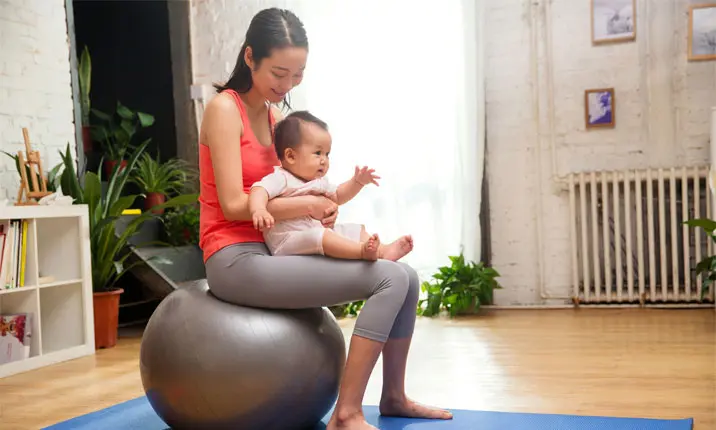A new baby brings with it chaotic schedules, but as things begin to settle down into a familiar routine, you may be thinking about going back to your regular workout routine. After all, sweating it out has its benefits, both mental and physical. The big question is, when will it be safe to start exercising regularly again?
Read on as we explain when it's safe to return to exercise and some of the key things to consider when drawing up a post-pregnancy workout routine.
Benefits of exercising after giving birth
Pregnancy and labour can be physically and mentally exhausting. This is why giving your body the time it needs to rest and heal, getting enough nutrition and exercising are key to recovery.
Among the numerous benefits, exercising after pregnancy will help in strengthening and toning the abdominal and pelvic muscles that were used during the course of pregnancy and the actual childbirth itself. Clocking in regular physical activity also boosts a new mother's energy levels, relieves stress, and staves off postpartum depression. Naturally, it also helps in burning off the extra weight gained during pregnancy.
When can a new mother start exercising?
You may be eager and motivated to get started as soon as possible, but it's best to resume exercising gradually, and only after getting the okay from your obstetrician.
The ideal time to get started will also depend on how your child was delivered and if there were any complications during the process.
Typically, mothers who went through a normal vaginal delivery may start exercising about 4 weeks after giving birth. But those who had a caesarean delivery, experienced extensive vaginal (perineal) tears, or a vaginal delivery with complications, should wait it out for a little longer. It is always best to consult your doctor in such instances, or if you have any doubts.
Tips for exercising after having a baby
Physical activity after delivering a baby can take many forms. New mothers can always begin with gentle movements in the first few days after giving birth.
It is important to keep things light and easy as your body will still be adjusting back to its pre-pregnant state, with several hormonal changes occurring simultaneously. Also, the exhaustion from the birthing process may make your body more susceptible to injury during this time.
Simple, easy movements can be good for blood circulation and help in healing, but be careful not to overdo it. Listen to your body's cues to know when to scale activity levels up or down. Do take note of any severe pain and stop the aggravating activity immediately if it is experienced.
Typically, within 6 – 8 weeks of starting the exercises, a new mother should be able to get back to pre-pregnancy levels of activity. This varies according to your pre-pregnancy fitness level as well as the exercise regime during pregnancy.
What's the best type of postnatal exercise to start with?
You can start with walking – the simplest form of exercise – before progressing to a new workout routine that helps you achieve your wellness goals.
On these walks, which can vary from a short one at home to longer excursions outside, mothers may even consider bringing baby along in a stroller for some fresh air. Gradually, low-impact aerobic workouts, pelvic floor and abdominal strengthening exercises, or even postnatal yoga routines can be started. These help with toning the muscles and prevent the abdominal wall from bulging and the pelvic floor sagging in future.
What are some risks to look out for when starting postpartum exercise?
While there are many health benefits to exercising, new mothers should be cautious if they haven't exercised regularly before or during pregnancy. Also, women who have had a caesarean delivery, assisted birth or experienced complications during delivery need to take special care.
In such cases, start slow and always wait until your doctor has given you the go-ahead to start exercising. Go easy on strenuous abdominal workouts in the beginning and stop any activity if bleeding, pain or discomfort is experienced.
Exercise can help you recover fast, make you stronger and improve your mood. But the right time to start exercising depends on your circumstances – so always check with your doctor first.














